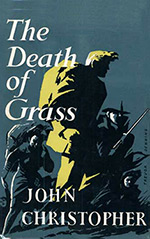
![]() Sable Aradia
Sable Aradia
6/13/2016
![]()
Read for the Apocalypse Now Reading Challenge 2016.
Method of the world's destruction: an epidemic virus that kills all grasses; including wheat, rye, barley and rice, causing worldwide famine and panic.
This is a great novel about human nature; about how it's easy to distance oneself from suffering when it's on the other side of the world; about how civilization as we understand it is a new invention that depends upon modern agriculture, and a thin veneer besides the point; and about how quickly we are willing to kill for our own survival.
Some have said that it reminds them somewhat of Lord of the Flies. Certainly its message about the barbaric nature of humanity is the same. But otherwise it's a very real, very human, apocalypse story. Initially it reminded me of a classic National Film Board of Canada cartoon, in which an older couple is arguing while the world descends into global thermonuclear war around them, and they're oblivious as they go about their everyday lives. The characters here are normal human beings doing normal human things. The famine that starts in China due to the grass-destroying Chung Li virus, which kills rice, seems very far away, and the characters engage in their colonial white privilege of "benevolent concern" while doing not much of anything for the starving people of China.
Then it turns out that not only is the virus spreading through Europe, but it kills other kinds of grass as well, including wheat, barley, rye, and pretty much every other major food crop except corn. And the government lies to the people of England about the nature of the threat and the existence of an anti-virus.
In the meantime, the protagonist John's brother David has a farm in a defensible valley, and when things start getting odd he tells his brother he's going to let the grasses die and plant beets and potatoes; and he's going to build a barricade across the valley. Just in case. And he tells his brother to come up if it looks like there's going to be trouble.
John's friend Roger has a public relations job with the government, so he warns John of the danger breaking and they head for the hills. Except that they almost miss their window to get out, and on the way they will have to fight for their survival and make a lot of ethically grey or even unethical decisions to assure their survival.
It's a dissertation on the essentially savage nature of humanity. And it's very real. Never mind Mad Max's craziness; this is what a real apocalypse would look like, and how real human beings would react.
If you want a realistic apocalyptic novel, about human beings being human beings in a very bad situation, this is the ideal. One of the best novels I've read in a while. Highly recommended!